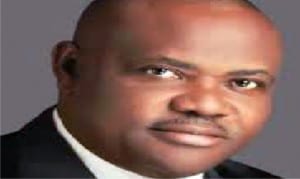Business
Rivers State Microfinance Agency In Tune With The New Rivers Vision

Governor Wike
In order to put the record
straight and in line with the New Rivers Vision, the policy of the present administration, the facts must be laid bare for public observation, scrutiny, analysis and inference to be drawn to gauge the growth of the Rivers State Microfinance Agency, its capacity building structure and contribution to the overall economic development of the state.
Presently, the new leadership of RIMA has provided a template for total departure from the usual pattern of inconclusive policy initiative and defective accounting reports, which has beset the organization from inception and has thereby, created liability and losses for the Agency’s bottom line mandate.
A juxtaposition of previous financial report by the past administration in RIMA is totally incomparable with the new financial reports posted and the achievements of the present leadership.
This is a swift reaction to the misguided and unfounded assertion credited to an article published in a National Newspaper “Rivers State Microfinance agency gives Kudos to Wike for CBN =N=2B MSME Loan- but past finance commissioner says Amaechi did most of the job”.
It is with great dismay that the management of RIMA views such distorted and ambiguous issues raised by this ill-informed writer capable of misleading the general public on the transactions and operations of RIMA in carrying out its dual functions /responsibility – Double Bottom Line strategy. This is to say, fostering wealth creation – bottom up and capacity building. It is a misleading, ill-conceived and mischievous write-up meant to paint the Agency in questionable pictures and bringing it to disrepute.
The integrity of the management and board is of unblemished antecedent and impeccable record. This unparalled quality marks the team of management and board as distinguished persons.
RIMA has put in place modalities to cut down high operational cost. RIMA has also initiated methodologies to tackle low banking culture in the rural areas and among the urban poor, by taking banking to their door steps. In spite of these factors militating against the progress of Microfinance Banks, RIMA is thorough and selective in its approach in carrying out the double bottom financial line. The rascality of the previous management is epitomized by the losses incurred throughout the duration of the administration between 2010- 2015.
Traditionally, our rural folks borrow money from friends and relatives and repay the same amount of money borrowed at very exhorbitant rate with disregard to measured tenure for the loan repayment. This is why RIMA is working assiduously to bridge that gap and lift modern standards in adherence to International Microfinance Banking best practices.
RIMA is evolving policies to cushion the paucity of human and institutional capacity building. RIMA is not in inordinate competition with commercial banks but braces the task of leveraging Micro, Small, Medium Enterprises into profiteering institutions through single digit interest rate borrowing.
RIMA has decided to take it more seriously, its core objective of reaching the poorest households through sustainable business approach using loan not as grants and for charity driven projects but loans repayable with not more than 9% interest rate all inclusive.
The success of RIMA is associated with its financial loan outcome through the loan portfolio quality to beneficiaries CFI (City Finance Institution), RFI (Rural Finance Institution) and other categories of beneficiaries. This is the management of loans for benefiting Institutions and its recovery.
RIMA is striving to achieve social and financial goals. This is managing a double bottom line. Candidly, strong financial performance underpins the agency’s ability to pursue its social objectives, and conversely, achieving goals generally enhances financial performance. This is exactly why this present leadership in RIMA is determined to succeed.
In the said publication, it was erroneously insinuated that the Rivers State Micro Finance Agency (RIMA) had posted a profit of one billion naira accruing from the seed capital of two billion naira generated through the management of SME funding. This is not true and totally unrealistic. It is unimaginable that at a time the Agency was in a comatose position, it was posting positive result and surprisingly profit.
A clear indication shows the pointer to losses incurred from the financial statement of RIMA for five years (2010-2015) buttressing the fact that the Agency was operating at loss and heading for a catastrophic end.
A summary of the financial details between the period 2010-2015 (the period under review) from auditing shows that RIMA incurred losses to the tune of :
=N= 144, 170, 114.00 K (2011) Loss
=N= 273, 708, 948.00 K (2012) Loss
=N= 163, 146, 712.00 K (2013) Loss
=N= 197, 314, 118.00 K (2014) Loss
=N= 194, 584, 973.00 K (2015) Loss
Which brings the total amount to :
=N= 972, 924, 865.00K
It is also not true that the previous administration was at the verge of securing the Central Bank of Nigeria MSME fund for onward lending to end users in the various categories of micro, small, medium entrepreneurs at a single digit interest rate. Amaechi’s administration found it very difficult to access the loan. It would have been for political intent and purposes. This is as exemplified by the previous loans secured. The dubious and unscrupulous nature of the documentation of the application alerted the CBN of the underlying interests behind the loan.
This prompted action, the Central Bank of Nigeria in halting the process of accessing the loan by former Governor, Rt Hon Chibuike Amaechi. Of what use was the three billion naira Agricultural loan from the federal government put into by the Rotimi Amaechi administration? Who were the beneficiaries of these loan? This was a clear indication that if the (CBN) had granted the loan as earlier applied, it would have been yet another largesse for diversion and political patronage. The erstwhile administration never provided the required framework and conditionality by which the Central Bank of Nigeria (CBN) would have allowed that administration to access her own quota of the two billion naira of the two hundred and twenty billion naira targeted for the scheme by the Goodluck Jonathan’s administration.
The loan application as prepared by the Amaechi administration to access the two billion naira SMEs, was fraught with irregularities and discrepancies, which therefore necessitated the CBN in carrying out a thorough verification and formal examination of the true identity of the would be beneficiaries. It was found to be a sham and a bogus accounting procedure meant to divert the fund into purposes for which it was not originally meant for. A clear example of the dubious and diversionary tactics employed in accessing other federal government funds was the three billion naira Agricultural loan earlier secured and put forward.
It was quite obvious, that any money further released to the previous administration by the (CBN) was bound to be diverted for political patronage and election purposes. Just like the previous efforts for the Agricultural loans.
This was why the Central Bank halted the further payments to the previous administration.
It is surprising that after the processing of all the documentations, by the previous administration the money was not released. This was a result of that administration’s inability to provide the necessary platform, which has been met by the Wike’s administration in so short a time.
The state Governor, Chief (Barrister) Nyesom Wike has pledged its resolve in ensuring transparency and accountability in the management of the two billion naira SME fund. It has already mobilized beneficiaries across the 23 Local Government Area councils to show the workability and spread through the different strata.
Governor Wike has assured the people of the state that his administration will take proactive measures in ensuring that (SMSE) will grow. He further stated that his vision is for entrepreneurship development, poverty reduction, creation of jobs and ensuring food security.
The condition for issuing out the loan by (RIMA) would be friendly enough for beneficiaries. To show the magnanimity, honesty and sensitivity by the present administration led by Nyesom Wike, the Rivers state Government would serve as a collateral for the SMSE in order for these entrepreneurs to play very active roles in the growth and economic development of the state to create opportunities.
Obomanu is of Radio Rivers, Port Harcourt.
Business
MWUN Backs Nigeria’s Bid For IMO’s Category C Seat
Business
Food Security: FG To Review Nigerian Agric laws
Business
Okpebholo Charges Committee To End Herders, Farmers Clash In Edo … Inaugurates Boundary Committee
-
Sports4 days ago
Makinde Fulfills Land Promise To Shooting Stars Players
-
News4 days ago
U.S. Envoy Warns Hezbollah Against Entering Israel-Iran Conflict
-
Politics4 days ago
LG Elections Beneficiaries Remain Sacked — OSIEC
-
Niger Delta4 days ago
Diri To Deliver UNIPORT’s 35th Convocation Lecture July 25th … As UNIPORT’s Mgt Visits Bayelsa
-
News4 days ago
I Have No Regrets Over My Life Paths, CharlyBoy Says At 75
-

 News4 days ago
News4 days agoFG’ll Unlock Potential Of All States, Says Tinubu
-
Sports4 days ago
Shaibu Set To Overhaul NIS
-
Business4 days ago
PINL Awards Scholarships To 645 Persons … Presents Empowerment Packages For Host Communities.

